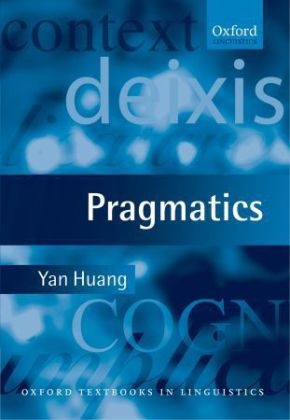Mehr lesen
Zusatztext [T]he book is very thorough in its coverage of topics within the field. Mindful of its student audience! it also has extensive study questions! examples! and glossaries. My overall impressions is that it is a valuable textbook to anyone in the field of pragmatics. Informationen zum Autor Yan Huang is Professor of Theoretical Linguistics at the University of Auckland. He has a PhD from the University of Cambridge and a DPhil from the University of Oxford! and has taught linguistics at both universities. His published work includes The Syntax and Pragmatics of Anaphora (CUP! 1994) and Anaphora: A Cross-Linguistic Study (OUP! 2000). He has also published a number of articles and reviews in leading international journals of linguistics. Klappentext This introduction to pragmatics provides an authoritative and comprehensive account of its central topics and a guide to the latest research. After describing the subject's scope and history! it examines conversational and conventional implicature! presupposition! speech act theory! and deixis. It then explores the interfaces between pragmatics and other core areas of inquiry! including cognition (focussing on relevance theory)! semantics! and syntax. ProfessorHuang's lively account contains exercises with suggested solutions! a glossary! and guides to further reading. This is the ideal textbook for students of linguistics. It is also a valuable resource for scholars in related fields. Zusammenfassung This introduction to pragmatics - the study of language in use - provides an authoritative and comprehensive account of its central topics and a guide to the latest research. It opens with a discussion of the scope! meaning! and history of pragmatics from Aristotle to the present. It shows how the subject relates to the study of semantics! syntax! and sociolinguistics and to such fields as the philosophy of language! linguistic anthropology! and artificialintelligence.The remainder of the volume is divided into two parts. Part I begins with an account of classical and neo-Gricean theories of conversational and conventional implicature. It considers presupposition and speech act theory! and describes the different kinds of deixis. Part II explores some of the most productive current work in the subject! much of it at the interface between pragmatics and other core areas of inquiry. It looks at the pragmatics-cognition interface and relevance theory beforeexamining the interfaces between pragmatics and semantics and pragmatics and syntax.Professor Huang illustrates his lively account with examples drawn from English and a wide range of the world's languages. He includes exercises and essay topics at the end of each chapter! and offers guidance and suggested solutions at the end of the volume. He provides a full glossary of terms and guides to further reading. This is the ideal textbook for students of linguistics. It will also be a valuable resource for scholars and students of language in philosophy! psychology! anthropology!and computer science. Inhaltsverzeichnis 1. Introduction ; PART I CENTRAL TOPICS IN PRAGMATICS ; 2. Implicature ; 3. Presupposition ; 4. Speech Acts ; 5. Deixis ; PART II PRAGMATICS AND ITS INTERFACES ; 6. Pragmatics and Cognition: Relevance Theory ; 7. Pragmatics and Semantics ; 8. Pragmatics and Syntax ; Glossary ; References ; Suggested Solutions to Exercises ; Index of Names ; Index of Languages ; Index of Subjects ...

